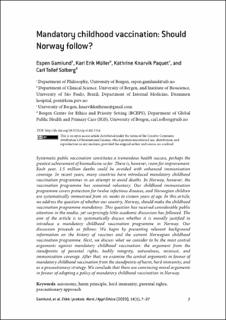| dc.description.abstract | Systematic public vaccination constitutes a tremendous health success, perhaps the greatest achievement of biomedicine so far. There is, however, room for improvement. Each year, 1.5 million deaths could be avoided with enhanced immunisation coverage. In recent years, many countries have introduced mandatory childhood vaccination programmes in an attempt to avoid deaths. In Norway, however, the vaccination programme has remained voluntary. Our childhood immunisation programme covers protection for twelve infectious diseases, and Norwegian children are systematically immunised from six weeks to sixteen years of age. In this article, we address the question of whether our country, Norway, should make the childhood vaccination programme mandatory. This question has received considerable public attention in the media, yet surprisingly little academic discussion has followed. The aim of the article is to systematically discuss whether it is morally justified to introduce a mandatory childhood vaccination programme in Norway. Our discussion proceeds as follows: We begin by presenting relevant background information on the history of vaccines and the current Norwegian childhood vaccination programme. Next, we discuss what we consider to be the most central arguments against mandatory childhood vaccination: the argument from the standpoints of parental rights, bodily integrity, naturalness, mistrust, and immunisation coverage. After that, we examine the central arguments in favour of mandatory childhood vaccination from the standpoints of harm, herd immunity, and as a precautionary strategy. We conclude that there are convincing moral arguments in favour of adopting a policy of mandatory childhood vaccination in Norway. | en_US |

